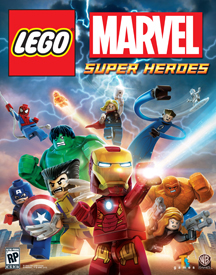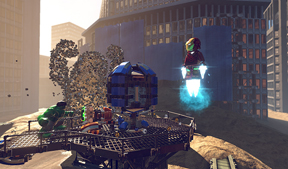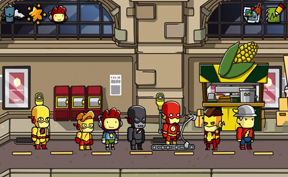I couldn’t be happier that 99 percent of all current movies—including Thor: The Dark World, due in theaters this week—seem to feature somebody in a cape or a miraculous suit of armor battling evil. Full disclosure: I was way into superhero comics when I was a kid. I managed to amass hundreds, which I kept in cardboard long boxes, re-reading them over and over throughout my tortured adolescence. I didn’t buy them for collecting purposes, thank goodness; years later, I traded in the entire lot for $10 and a key lime pie, and considered myself lucky to have gotten that much.
(Seriously, folks, if you started collecting comics during the 1990s or later, they’re not going to put your kid through college. It just won’t happen.)
My point is, I’m a huge superhero fan. However, I’ve started to feel super-saturated by all the licensed comic book-based movies and TV shows popping up of late. They always seem so serious, with all the world-saving and high drama, the death and epic romance and heroic posturing. It’s great the first time, pretty good the second, but around the umpteenth, I have to fight the urge to stand up and yell, “Hey, grown person in hockey pants! Aren’t we supposed to be having fun here?”
For that reason, I am grateful for the recent trend in video games based on licensed superhero properties, specifically those from Warner Bros. Interactive Entertainment. While its offerings of late include the very seriously toned Batman: Arkham Origins, the company is also responsible for two titles that manage to be respectful of the superhero genre, while simultaneously turning it on its head in ways that are funny and downright fun. Both games are available now and suitable for kids ages 10 and up.
 Lego Marvel Super Heroes: This one, from Warner Bros. and TT Games, combines all the action of Marvel Comics with the game play of Lego video games. Players climb into the skins and costumes of such iconic characters as Iron Man, Captain America, and Spider-Man, ostensibly to stop Loki from an act of super-villainy. The game is available on a wide variety of platforms, with noticeable differences between the console and handheld versions. However, both offer a wide roster of playable heroes with distinct abilities, e.g., Iron Man can fire laser beams and fly, Hawkeye can shoot arrows at targets via a bulls-eye cursor, etc. Then there is the Hulk, who is—not surprisingly—enormous compared to other Lego avatars, and can toss around vehicles and all sorts of objects with ease.
Lego Marvel Super Heroes: This one, from Warner Bros. and TT Games, combines all the action of Marvel Comics with the game play of Lego video games. Players climb into the skins and costumes of such iconic characters as Iron Man, Captain America, and Spider-Man, ostensibly to stop Loki from an act of super-villainy. The game is available on a wide variety of platforms, with noticeable differences between the console and handheld versions. However, both offer a wide roster of playable heroes with distinct abilities, e.g., Iron Man can fire laser beams and fly, Hawkeye can shoot arrows at targets via a bulls-eye cursor, etc. Then there is the Hulk, who is—not surprisingly—enormous compared to other Lego avatars, and can toss around vehicles and all sorts of objects with ease.
In the console version, the levels have more of an open world feel, meaning players are free to roam and go on side missions. By comparison, the handheld-only Lego Marvel Super Heroes: Universe in Peril seems more bare-bones. The levels feel shorter, and some consist entirely of fights with Doctor Octopus or other villains. This might appeal to a gamer who just wants to work out some aggression quickly. For what it’s worth, the Nintendo 3DS version makes good use of the hardware’s special features. To make Spider-Man swing around on his webs, for example, one makes an upward motion on the touchscreen. Meanwhile, both versions of the game require players to use certain heroes at particular times.
 As far as taking a superhero epic and making it fresh, fun, and noticeably less grim than it could be, it helps that much of this universe is built on Legos. Make no mistake: Throughout the course of Lego Marvel Super Heroes, players cut a swath of impressive destruction through New York City and other locales. They also amass a considerable body count, possibly greater than all the Marvel films combined. However, when objects including cars and trains are destroyed and bad guys are smitten, they explode into colorful Lego building blocks, which somehow makes things seem less violent, and more slapstick-y. Similarly, when a player’s avatar gets killed, it topples and reverts into component Lego pieces. The implied message seems to be that it’s never game over, just time to do a quick rebuild.
As far as taking a superhero epic and making it fresh, fun, and noticeably less grim than it could be, it helps that much of this universe is built on Legos. Make no mistake: Throughout the course of Lego Marvel Super Heroes, players cut a swath of impressive destruction through New York City and other locales. They also amass a considerable body count, possibly greater than all the Marvel films combined. However, when objects including cars and trains are destroyed and bad guys are smitten, they explode into colorful Lego building blocks, which somehow makes things seem less violent, and more slapstick-y. Similarly, when a player’s avatar gets killed, it topples and reverts into component Lego pieces. The implied message seems to be that it’s never game over, just time to do a quick rebuild.
 Scribblenauts Unmasked: A DC Comics Adventure: On the surface, dovetailing a licensed superhero universe with Scribblenauts, a video game franchise that challenges players to use words to solve puzzles and overcome obstacles, might not seem the obvious choice. After all, superheroes have a reputation for solving their problems through physical action, e.g., smashing, hitting things with a hammer, as opposed to using the written word. But in the recent Scribblenauts Unmasked: A DC Comics Adventure, it turns out that Maxwell, the main protagonist of Scribblenauts, is not such a misfit in the DC Comics universe, the home of such characters as Superman and Batman. Maxwell has a magical notebook that grants him godlike power—he can make any object he writes materialize, with some limitations. Yet he’s inherently a good kid, so he uses it for good and not evil.
Scribblenauts Unmasked: A DC Comics Adventure: On the surface, dovetailing a licensed superhero universe with Scribblenauts, a video game franchise that challenges players to use words to solve puzzles and overcome obstacles, might not seem the obvious choice. After all, superheroes have a reputation for solving their problems through physical action, e.g., smashing, hitting things with a hammer, as opposed to using the written word. But in the recent Scribblenauts Unmasked: A DC Comics Adventure, it turns out that Maxwell, the main protagonist of Scribblenauts, is not such a misfit in the DC Comics universe, the home of such characters as Superman and Batman. Maxwell has a magical notebook that grants him godlike power—he can make any object he writes materialize, with some limitations. Yet he’s inherently a good kid, so he uses it for good and not evil.
The game play is similar to previous Scribblenauts games, though this time around, some of the puzzles take on the form of rampaging super villains. Maxwell can try to punch them into submission; however, the game is always more interesting when he—and therefore the player—uses wits and a well-placed adjective. For example, at one point early on, a scar-faced criminal can be transformed into a tiny version of himself to be carried off to jail. All the various DC heroes and villains look like cute, super-deformed versions of themselves, but overall, Warner Bros. and game developer 5th Cell get their personalities and abilities down.
The end result is a vision of the DC Universe that is fairly lighthearted and surprisingly cerebral. And that’s fine by me. If more superheroes led by their brains instead of adrenal glands, I might never have stopped collecting comics. On the other hand, I live in a really small apartment now, and I can make my own pies.
For more commentary from Phil, check back often. Views expressed in this column are solely those of the author and do not necessarily reflect the views of The Toy Book as a whole. We hope that you will share your comments and feedback below. Until next time!

